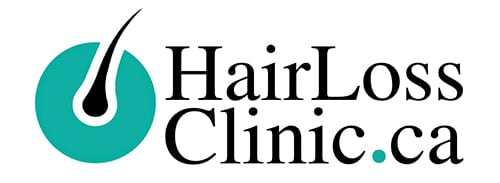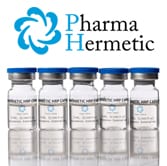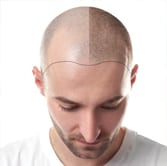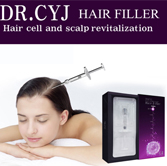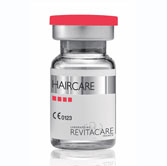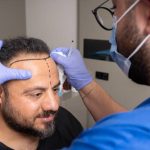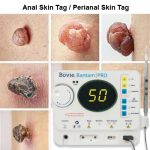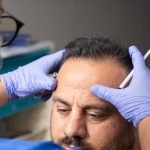
TELOGEN EFFLUVIUM | CAUSE & TREATMENT | HAIR LOSS CLINIC TORONTO
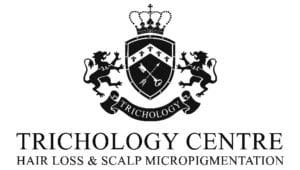
FREE ONLINE HAIR LOSS ASSESSMENT FORM
What is Telogen Effluvium?
Telogen effluvium is a temporary hair loss condition that can affect women. It is the second most common type of hair loss diagnosed. Telogen effluvium looks very similar to female pattern hair loss in that they both have diffused hair thinning throughout the scalp area. Although the hair starts falling out, the hair follicles remain intact and can start producing hair again resulting in hair regrowth.
To understand telogen effluvium, you first need to understand the 3 main hair cycles.
The Anagen phase
The Anagen phase is the growth phase. About 90% of your hairs are in this stage. The cells in the hair bulb divide rapidly creating new hair growth. Hair actively grows from the roots for an average of 2-7 years before hair follicles becomes dormant. In this time, hair can grow anywhere between 18-30 inches.

The Catagen phase
Catagen is the transitional phase between Anagen and Telogen. This period is short, lasting only 2-3 weeks on average. In this transitional phase, hair stops growing and detaches itself from the blood supply and is then named a club hair.
The Telogen phase
The final phase or resting phase is called the Telogen phase. This phase begins with a resting period, where club hairs rest in the root while new hair begins to grow beneath it. This phase lasts for around 3 months.
What happens in telogen effluvium is a change in the number of hair follicles that are in the anagen phase that, triggered by a trauma to your body, changes quickly to the telogen phase creating more dormant hair follicles. This results in hair thinning and diffused hair loss.
Telogen effluvium can be triggered by many traumatic things to your body such as a poor diet (lacking certain vitamins or minerals), sudden weight loss due to dieting, surgery, certain drugs, extreme stress, metal toxicity, pregnancy, menopause, and other underlying health conditions. So, it is important for a Trichologist to ask you questions about these issues to determine what other things could be contributing to your hair loss. Telogen effluvium is a temporary hair loss condition and once the underlying issue is resolved, your hair should start growing back in three to six months.
Triggers causing Telogen Effluvium
- Hormonal changes – childbirth, menopause
- Physical trauma
- Emotional stress
- Poor nutrition
- Birth control pills
- Medication
- Radiation therapy
- Illnesses, such as diabetes and lupus
- Significant weight loss
The hair loss in telogen effluvium usually starts after 3 months of the triggering event and can last about 6 months, in more extreme cases lasting up to a year. Therefore, if you are just starting to notice your hair loss, you may want to look back at the events 3 months ago that may have triggered telogen effluvium.
Telogen effluvium hair follicles remain intact. The long telogen hair is replaced by shorter anagen hair that starts to grow from the follicle. Once the new anagen hair starts to grow in 3 to 6 months, the hair loss caused by telogen effluvium is resolved.
Characteristics of Telogen Effluvium
- Normal looking scalp
- Diffused hair loss all over the scalp
- Temporary hair loss
- Losing hair has white bulb and lack of shiny sheath
- Dry looking hair that are sparse and easily pluckable
- Hair colour changes from dark to brown, or red, brown to blond
Nonmedical Treatments for Telogen Effluviuim
At the TRICHOLOGY CENTRE, more natural treatments for telogen effluvium is preferred over prescribed drugs as many of them have negative side effects. We have proven hair loss treatments and nutritional counselling that can stabilizes and help with the regrowth of your hair.
Micronutrients
The role of diet and nutrition to help telogen effluvium is growing. New evidenced-based recommendations that micronutrients including certain vitamins and minerals have shown positive results. Micronutrients can reduce oxidative stress, an increasingly suspected contributor to telogen effluvium. Vitamin D for example, have shown to help modify the immune response by inhibiting Th1 cell proliferation.
Vitamin D – Vitamin D boosts immunity, keeps bones strong and skin healthy, stimulates cell growth, and helps create new hair follicles. Vitamin D deficiency has been linked to telogen effluvium.
Iron or ferritin – Iron deficiency remains the most common nutritional deficiency in the world, a sign of which includes chronic diffuse telogen hair loss.
Vitamin A or retinoid or retinol – Vitamin A is an essential vitamin for hair follicles. It also helps skin glands make sebum. Sebum moisturizes the scalp and helps keep hair healthy.
Biotin – Biotin is an important coenzyme for carboxylation reactions. Biotin deficiency has been shown to cause hair loss.
Vitamin E – Like vitamin C, vitamin E is an antioxidant that can prevent oxidative stress. In one documented study, people with hair loss experienced a 34.5% increase in hair growth after supplementing with vitamin E for 8 months.
Magnesium – Magnesium acts as a cofactor for over 300 enzyme systems, and plays an important role in nucleotide synthesis, a frequent process in the rapidly dividing hair follicle.
Zinc – Zinc is an essential mineral upon which hundreds of enzymes depend for their catalytic activity
Vitamin C – Vitamin C is a powerful antioxidant that helps protect against the oxidative stress caused by free radicals. It also helps your body absorb iron, a mineral necessary for hair growth.
Selenium – Selenium also contributes to antioxidant defense mechanisms via its interaction with the enzyme glutathione peroxidase.
Vitamin B12 or cobalamin – B12 contribute to nucleic acid production and thus possess an important role in the health of the hair follicles.
Folic acid or folate – Folic acid is primarily responsible for healthy cell growth including the cells in hair follicles.
Copper – copper acts with zinc in the antioxidant enzyme copper/zinc superoxide dismutase.
Adding certain vitamins and minerals can help promote hair growth and nurture the hair follicles and scalp. Speak with a certified Trichologist on the best dietary, vitamins and minerals to help you with telogen effluvium.
PRP in Hair Treatment
For individuals dealing with telogen effluvium, a prevalent condition marked by excessive hair shedding, Platelet-Rich Plasma (PRP) has gained recognition as a promising treatment option. PRP therapy involves extracting and concentrating growth factors from the patient’s blood, which is injected into the scalp. These growth factors stimulate hair follicles, promote hair regrowth, and improve scalp health.
The PRP treatment commences by obtaining a small quantity of the patient’s blood, which is subsequently subjected to centrifugation to separate the platelet-rich plasma from the remaining components of the blood. The concentrated PRP is then carefully injected into the affected areas of the scalp. The growth factors in PRP work by enhancing blood circulation, stimulating the proliferation of hair follicle cells, and prolonging the active growth phase of the hair cycle.
This can lead to an increase in hair thickness, density, and overall hair volume. PRP therapy for telogen effluvium is typically performed in sessions spaced several weeks apart to optimize results. It is important to note that PRP therapy is a minimally invasive procedure with minimal discomfort and downtime. While individual results may vary, many individuals with telogen effluvium have reported significant improvements in hair growth and overall health after undergoing PRP treatment.
However, consulting with a qualified healthcare professional or trichologist is essential to determine if PRP therapy is the right option for managing telogen effluvium in each case.
AAPE® STEM CELL THERAPY
AAPE® (Adipose-derived stem cells Protein Extracts) is a mixture of refined growth factors extracted from human adipose to promote hair growth and scalp health using outstanding ingredients approved by US FDA and CFDA. AAPE has been proven to be highly effective therapy for hair regeneration. For more information about AAPE visit Here
PHARMA HERMETIC HAIR RECOVERY PROGRAM®
Pharma Hermetic Hair Recovery Program® works at revitalizing the hair bulb and obtaining a greater thickness and strength. It helps strengthen the anchorage of the root and rebalance the scalp.
In addition, the Hair Recovery Program® SP55, enhance the growth of new hair and activates dormant follicles thanks to its effective active ingredients. Providing all the necessary nutrients to repair the weakened and brittle hair. After the treatment, the hair becomes thicker and more voluminous.
We rely on ingredients suitable to penetrate the scalp and stop hair loss.
- Thicker hair.
- More density.
- No side effect.
- Topical application.
- Lasting results.
NOURKRIN® WOMAN HAIR LOSS
If you’re worried about certain hair loss medications that contain ingredients that may cause some side effects such as Minoxidil, we offer a hair loss treatment called Nourkrin®. Nourkrin® contains natural ingredients and has been clinically proven to help thinning hair. The key active ingredients are marine-based extracts of proteins and polysaccharides that have been combined with silica, vitamin C, and horsetail extract. Developed by scientists in Finland, Nourkrin® has been the subject of many double blind, placebo-controlled clinical studies, the latest of which showed that 77% of all participants reported a positive effect during a six-month treatment period and their hair count increased by an average of 35.7%.
THERADOME® LASER HAIR THERAPY
The Theradome® brings you the world’s most advanced laser hair growth treatment to enjoy from the comfort of your own home. Unlike Light Emitting Diodes (LEDs) devices, our laser light targets the stem cells at the base of hair follicles. This allows the formation of a new photonic pathway that can restore hair to a healthy state. Theradome® one-of-a-kind laser hair helmet was engineered based on four crucial scientific criteria, which together provide the most powerful and efficacious laser hair growth treatment available. For more information about Theradome®, please visit Here
Q & A
What is telogen effluvium?
Telogen effluvium is a common type of hair loss characterized by excessive shedding of hair. It occurs when a significant number of hair follicles enter the telogen (resting) phase prematurely, leading to increased hair loss.
What causes telogen effluvium?
Telogen effluvium can be triggered by various factors that disrupt the hair growth cycle. Some common causes include physical or emotional stress, hormonal changes, nutritional deficiencies, certain medications, and medical conditions.
How is telogen effluvium different from other types of hair loss?
Telogen effluvium differs from other types of hair loss in terms of its underlying cause. Unlike conditions like alopecia areata or pattern hair loss, telogen effluvium is often temporary and reversible. It is characterized by a generalized thinning of hair rather than specific bald patches or receding hairlines.
What are the common symptoms of telogen effluvium?
The primary symptom of telogen effluvium is excessive hair shedding, which may be noticeable during activities like washing, brushing, or styling the hair. Other common symptoms include thinning hair, a widening part line, and increased hair shedding.
How long does telogen effluvium last?
Typically, telogen effluvium is a transient condition, and hair growth resumes to its normal state once the underlying cause is resolved. The duration of telogen effluvium varies from person to person and depends on factors such as the cause of the condition and individual health.
Is telogen effluvium reversible?
Yes, telogen effluvium is typically reversible. After successfully pinpointing and managing the underlying cause, the hair growth cycle slowly returns to its regular state, promoting the regrowth of hair.
Can stress cause telogen effluvium?
Yes, stress is one of the common triggers for telogen effluvium. Stressful events such as surgery, childbirth, severe illness, or emotional trauma can disrupt the normal hair growth cycle, leading to excessive hair shedding.
Are there any specific medical conditions associated with telogen effluvium?
Certain medical conditions, including thyroid disorders, autoimmune diseases like lupus, and scalp infections, have been linked to telogen effluvium. These conditions can disrupt the hair growth cycle and contribute to increased hair shedding.
How is telogen effluvium diagnosed?
The diagnosis of telogen effluvium often entails a comprehensive assessment of the patient’s medical history, a thorough scalp examination, and occasionally supplementary tests. A dermatologist or trichologist may perform a pull test, examine the scalp for signs of inflammation or infection, and order blood tests to rule out underlying medical conditions.
Can nutritional deficiencies lead to telogen effluvium?
Yes, nutritional deficiencies, particularly deficiencies in iron, zinc, biotin, or vitamins, can impact hair health and contribute to telogen effluvium. Poor nutrition deprives the hair follicles of essential nutrients necessary for healthy hair growth.
Are there any medications that can trigger telogen effluvium?
Yes, certain medications can cause telogen effluvium as a side effect. Medications such as antidepressants, anticoagulants, beta-blockers, and retinoids have been associated with hair shedding. In most cases, the hair loss subsides once the medication is discontinued or the body adjusts to the medication.
Can hormonal changes, such as pregnancy or menopause, cause telogen effluvium?
Yes, hormonal changes during pregnancy or menopause can contribute to telogen effluvium. These periods are characterized by fluctuating hormone levels, which can disrupt the normal hair growth cycle and lead to increased hair shedding.
How can telogen effluvium be treated?
Treatment for telogen effluvium focuses on addressing the underlying cause and promoting a healthy hair growth cycle. This may involve managing stress levels, treating hormonal imbalances, addressing nutritional deficiencies through dietary changes or supplements, and adjusting or discontinuing medications as necessary. Topical treatments, such as minoxidil, may also be prescribed to promote hair regrowth.
Is there any way to prevent telogen effluvium?
While it may not always be possible to prevent telogen effluvium, maintaining a healthy lifestyle and managing stress levels can contribute to overall hair health. Minimizing the risk of telogen effluvium can be achieved by maintaining a well-balanced diet abundant in vitamins and minerals, adopting stress management techniques, and refraining from harsh hair treatments or styles that can lead to excessive hair pulling or damage.
When should I seek medical attention?
If you are experiencing excessive hair shedding or noticeable thinning of hair that persists for more than a few months, it is advisable to seek medical attention from a dermatologist or trichologist. They can evaluate your condition, identify any underlying causes, and provide appropriate treatment recommendations to manage telogen effluvium effectively.
With the numerous available treatments for telogen effluvium our Trichologist can recommend the best treatment that can help with telogen effluvium. At Trichology Centre, we have helped patients with telogen effluvium, advising them the best treatments available and helping them regain their confidence and self-esteem. Early assessment and treatment from the onset of hair loss is important and can help stimulate hair regrowth faster.
We have three clinics in the GTA,
TRICHOLOGY CENTRE | hairlossclinic.ca | hairtattoo.ca | laserhairtherapy.ca
600 Sherbourne St #605, Toronto
7191 Yonge St #701, Thornhill
112 Queenston St #200, St. Catharines
Please give us a call at 647-492-9093

FIND A TRICHOLOGIST IN TORONTO GTA
ADDRESS
Toronto, 600 Sherbourne St #605
Thornhill, 7191 Yonge St #701
St. Catharines, 112 Queenston St #200
Winnipeg, 873 Notre Dame #D
PHONE
(647) 492-9093
info@hairlossclinic.ca
WORKING HOURS
Mon-Sat 9:00 am - 8:00 pm
Sunday CLOSED
Comments are closed.
